Yukon Gold mashed potatoes are a classic comfort food, perfect for any occasion. Their natural creaminess and buttery flavor make them the ideal choice for smooth, fluffy mashed potatoes that steal the spotlight at the dinner table. You can make them traditionally with dairy or vegan, paleo, dairy-free, and Whole30-friendly.
And they’re the perfect Thanksgiving side! They’re great with this Traeger Smoked Turkey, Smoked Turkey Breast, or really any meat.
Why Yukon Gold potatoes are ideal for mashed potatoes
Yukon Gold potatoes are renowned for their versatility, but they truly shine in mashed form. Their medium starch content ensures a creamy yet cohesive texture, making them a favorite for chefs and home cooks alike. Here’s why:
- They have a naturally buttery flavor, reducing the need for excessive butter or cream.
- Their smooth, dense texture creates velvety mashed potatoes without being gluey or watery.
- They cook evenly and mash easily, saving time and effort in the kitchen.
Compared to Russet potatoes, which can become crumbly, or red potatoes, which lean waxy, Yukon Gold potatoes offer the best of both worlds for a luxurious finish.
Ingredients
Here’s an overview of what you’ll need to make these gold mashed potatoes.
If you don’t have any fresh garlic on hand, you can use 1 1/4 teaspoons of granulated garlic. Or for garlic powder, use 5/8 teaspoon.
I talk about the dietary-friendly subs in the section above the recipe box.
How to make them
Boiling all your potatoes together in a pot might seem like the easiest method, and it can work, like for the Cheesy Mashed Potatoes I posted yesterday, but in a lot of recipes, it often leads to gummy mashed potatoes. I’ve been there myself many times.
After plenty of research and experimenting, I’ve discovered the best techniques to avoid this problem. Follow these tips, and you’ll make the best homemade mashed potatoes every time. Here’s how.
Cut and rinse the potatoes
This step is often overlooked, but it makes a big difference. After cutting the potatoes, rinse them thoroughly. This helps remove excess starch, a key culprit behind gummy potatoes.
Steam the potatoes
Boiling potatoes can leave them waterlogged, which prevents them from properly absorbing the milk and butter. Steaming, on the other hand, avoids this issue and reduces the risk of overcooking.
Steam the potatoes until they’re very tender—this ensures they’ll mash smoothly and effortlessly.
Dry the potatoes after steaming
Once you’ve removed the potatoes from the steamer, drain any remaining water. Return the potatoes to the pot and place them back on the burner without the lid for a few minutes. Shake the pot occasionally to help them dry out completely.
This step helps address the water-logging issue mentioned earlier.
Coat the potatoes in butter
Mixing butter into the steamed and dried potatoes coats their starches, preventing them from interacting with the water in the milk. This keeps your mashed potatoes smooth, creamy, and fluffy instead of dense and gummy.
Mash them right away
I’ve made the mistake of letting steamed potatoes sit too long before mashing, and it doesn’t end well. This may not be true for all potato varieties, but in my experience, letting cooked potatoes sit for an hour or two often results in a poor texture.
Steam your potatoes, then mash them immediately – don’t leave them sitting around.
 How to make ahead
How to make ahead
This traditional mashed potatoes recipe is perfect for making ahead, saving you valuable time on busy cooking days. Follow these tips to prepare them in advance:
- Prepare the mashed potatoes as directed, then let them cool completely.
- Store the cooled potatoes in an airtight container in the refrigerator for up to 4 days.
- Reheat on the stovetop over low heat, adding milk to restore their creamy consistency. Stir frequently to ensure even heating. Turn the heat up and continue stirring until they have the perfect texture again.
This method is particularly useful for holiday meal prep, allowing you to focus on other dishes without compromising quality.
You can also freeze them for up to 3 months. Thaw overnight in the refrigerator before reheating.
When reheating frozen potatoes, reheat them as I wrote above.
Flavor variations
While Yukon Gold mashed potatoes are delicious on their own, you can easily customize them to suit your taste. Here are some ideas:
- Stir in roasted garlic or garlic-infused oil for a savory twist.
- Mix in cream cheese or sour cream for extra tanginess and richness.
- Add fresh herbs like chives, parsley, or thyme for a burst of freshness.
- Top with grated Parmesan or cheddar cheese for a cheesy version.
Troubleshooting
If your mashed potatoes don’t turn out as expected, here’s how to fix common issues:
- Gummy texture – this occurs when potatoes are overworked. To avoid this, mash gently and avoid using a food processor.
- Too thick – add more warm milk or cream, a little at a time, until the desired consistency is reached.
- Too runny – stir in instant potato flakes or mash an extra boiled potato to thicken.
- Too bland – add more salt, a pat of butter, or a pinch of garlic powder to enhance the flavor.
Stick to the directions!
I know it seems like a lot of liquid, but if you don’t add it all, the potatoes are going to come out gluey.
I’ve been making my potatoes like this for years, and they always come out creamy. I still even doubt myself when adding all that milk and cream, but they come out great.
What to serve with them
- Smoked Turkey Legs
- Smoked Spatchcock Chicken
- Venison Backstrap
- Smoked Ribeye Recipe
- Chicken Leg Quarters Recipe – we still make these every single week, usually with potatoes in the pan along with the chicken, but these creamy mashed potatoes are a nice change!
Vegan, dairy-Free, paleo, and Whole30 options
It’s easy to make this recipe all those things! This is actually how I usually make them.
Here’s what to use:
- Dairy-free milk (like almond, cashew, oat, or soy) instead of whole milk. If you’re paleo, use unsweetened almond or cashew milk.
- Canned coconut milk as a substitute for cream
- 6 tablespoons olive oil + 6 tablespoons refined coconut oil for paleo, Whole30, dairy-free, and vegan options OR 3/4 cup vegan butter for dairy-free and vegan
I don’t recommend replacing whole milk with coconut milk, as it can give the potatoes a noticeable coconut flavor. Coconut milk works best as a substitute for the cream only.
To keep the flavor neutral, opt for unsweetened dairy-free milk like almond, cashew, oat, or soy. If you’d prefer not to use coconut milk for the cream, you can use additional dairy-free milk instead. I like coconut milk because it adds extra fat and richness.
If you’re worried about coconut flavor, refined coconut oil is the key. Plus, the garlic in the recipe helps mask any coconut taste that you’ll get from the coconut milk.
They’re also naturally gluten-free. And if you’re looking for another amazing gluten-free side dish for Thanksgiving, this Gluten-free Mac and Cheese is my very favorite side dish.
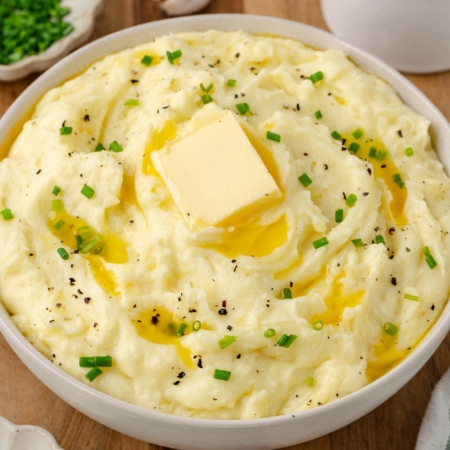
Yukon Gold Mashed Potatoes
Ingredients
- 3 pounds (1360 grams) Yukon Gold potatoes
- 3/4 cup (175 ml) whole milk
- 3/4 cup (175 ml) heavy cream
- 5 garlic cloves minced
- 1 1/2 + teaspoons salt
- 3/4 cup (168 grams) unsalted butter
Instructions
- Wash and peel the potatoes and cut into 1" chunks. Put them in a colander and rinse under cold water.
- Get out a steaming basket and a pot that's large enough for the steaming basket. Add an inch of water to the pot, and put in the steaming basket. Bring the water to a boil and add the potatoes to the steaming basket. Cover the pot with a lid.
- Turn the heat down to medium and steam for about 20-30 minutes or until tender. They should be fully cooked.
- Meanwhile, in a small saucepan over low heat, add the milk, cream, garlic, and salt (I recommend using 1 1/2 teaspoons and adding more later, if desired). Once it's all melted, turn the heat off (but keep the saucepan on the stove so it stays warm).
- Once the potatoes are fully cooked, remove the steamer basket from the pot and drain the water from the pot. Put the potatoes back into the pot and put the pot back on the burner (which is now off - if you have a gas or induction burner that's not still hot, then turn the heat to the lowest setting). Let any remaining moisture cook off for 1-3 minutes, shaking the pot occasionally.
- With an electric hand mixer (turned off) or a potato masher, break up the large potato pieces first. Stir in the butter (with a large spoon or silicone spatula) so that it coats the potatoes. It doesn't have to be perfectly mixed in - it just has to be melted and coat the potatoes.
- Add the milk mixture in 3 additions (using an electric hand mixer), starting off on low so that the liquid doesn't fly everywhere and then turning it up to high and beat until smooth and creamy. You need the full amount of liquid. Do not overmix! Taste and add more salt, if needed.
- Best if served immediately, as with all mashed potatoes. Let leftovers cool completely and then refrigerate in an airtight container for up to 4 days.
Notes
- Dairy-free milk (like almond, cashew, oat, or soy) instead of whole milk. If you're paleo, use unsweetened almond or cashew milk.
- Canned coconut milk as a substitute for cream
- 6 tablespoons olive oil + 6 tablespoons refined coconut oil for paleo, Whole30, dairy-free, and vegan options OR 3/4 cup vegan butter for dairy-free and vegan
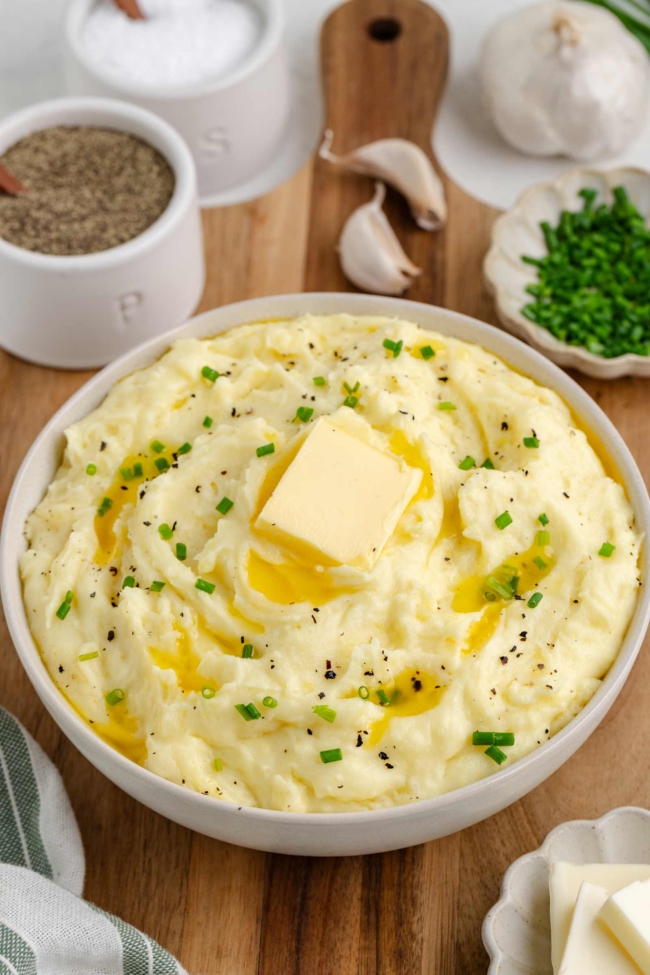
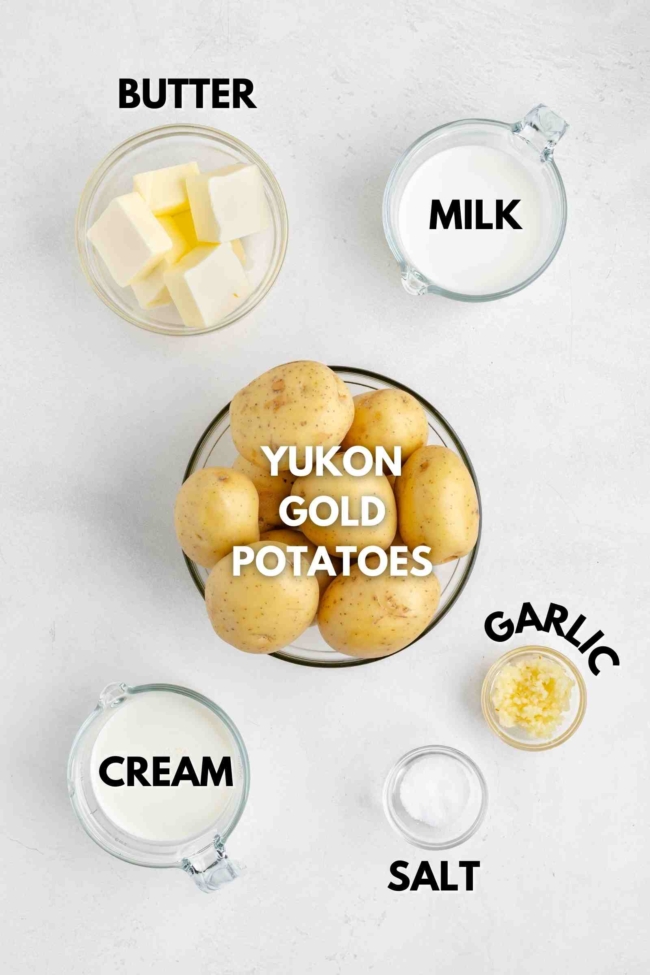
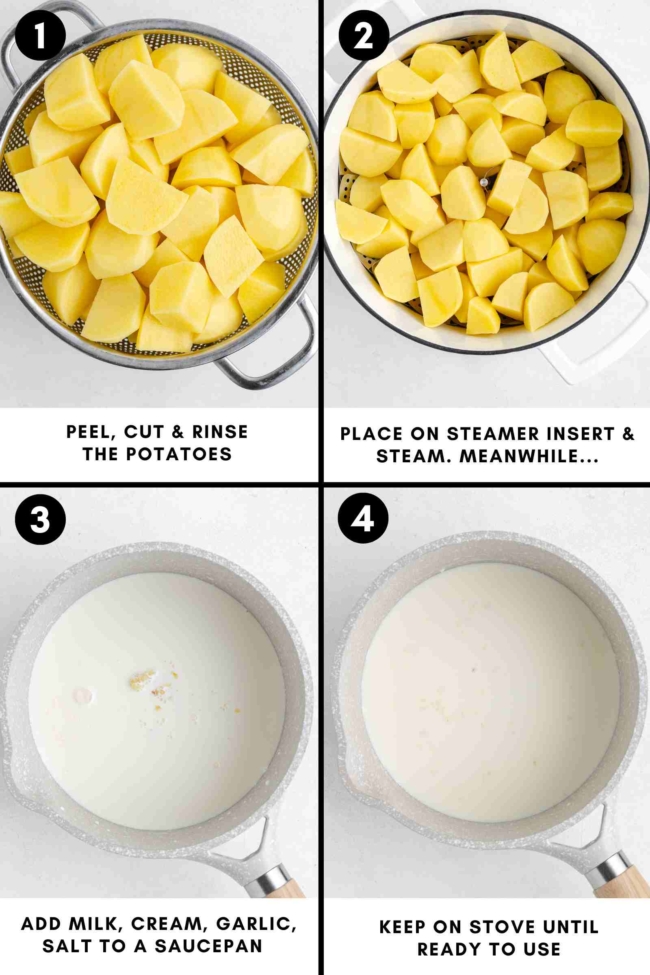
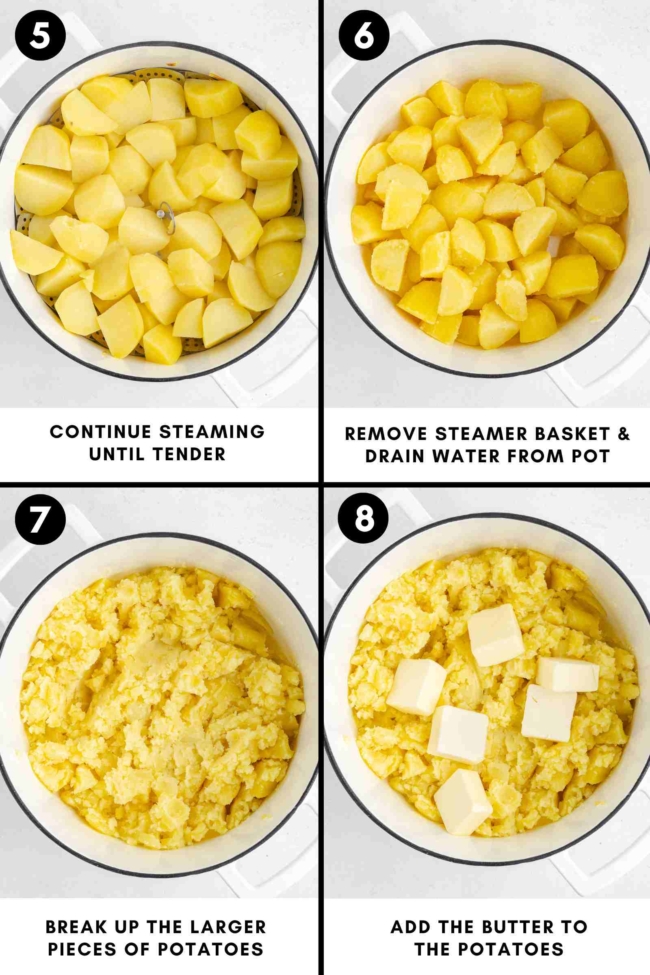
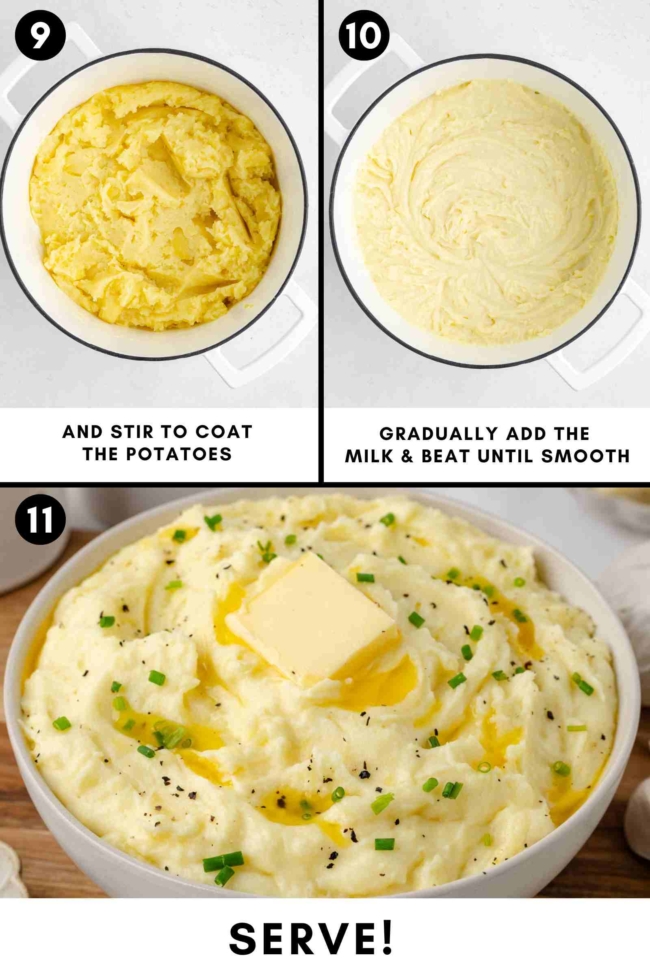 How to make ahead
How to make ahead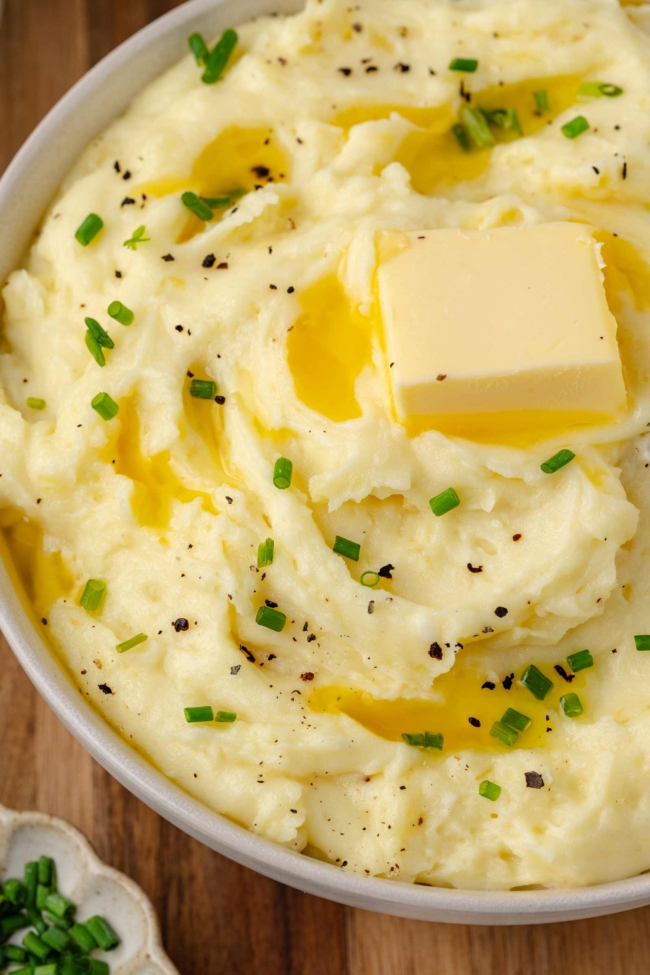
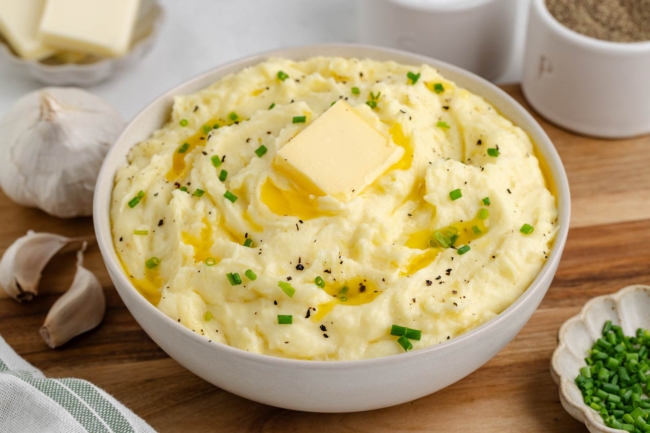
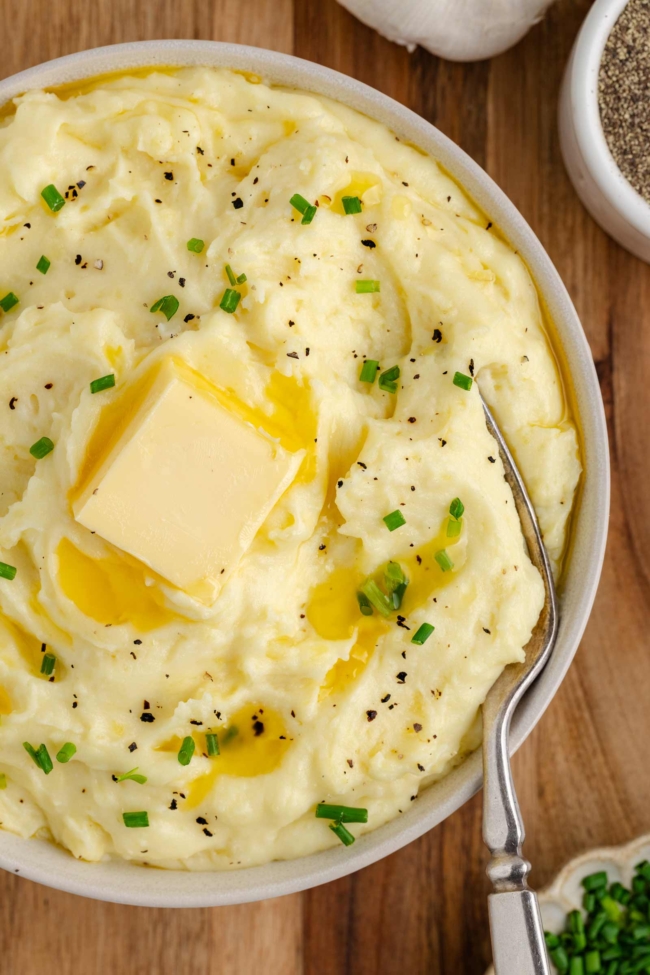









Leave A Reply!